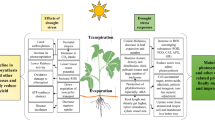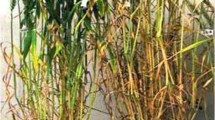Abstract
Water deficit stress is one of the major abiotic stresses that severely affects the plant performance and production especially when it occurs during the reproductive phase. That drought research is an ongoing approach as new breeding lines development is a continuous process. Therefore, a field experiment was conducted with recently developed 12 maize (Zea mays L.) genotypes under Well Water (WW) and Water Deficit stress (WDS) conditions to quantify the impact of WD stress on phenological, physio-biochemical and yield parameters. The results showed that WD stress significantly altered the Anthesis Silking Interval (ASI) among the genotypes but had no effect on the genotypes DTL-4–1 and Harsha. A significant decrease in net photosynthetic rate, stomatal conductance, transpiration rate and WUE was recorded with WD stress. Accumulation of proline under WD stress was significantly higher with DTL-4–1 and Harsha with a lower malondialdehyde (MDA) content and increased activity of SOD thereby maintained better cell membrane stability (CMS). Biomass and grain yield components were also significantly impacted by the water deficit stress. Among the maize genotypes, DTL-4, DTL-4–1 and Harsha showed better Stress tolerance index (STI). Under WD stress, grain yield showed significant positive association with proline, CMS, kernel number while negative association with MDA and ASI, indicating importance of these traits in imparting WD stress tolerance in maize.
Similar content being viewed by others
References
Alqudah, A., Samarah, N., & Mullen, R. (2011). Drought stress effect on crop pollination, seed set yield and quality. Sustainable Agriculture Reviews. https://doi.org/10.1007/978-94-007-0186-1_6
Anjum, S. A., Ashraf, U., Tanveer, M., Khan, I., Hussain, S., Shahzad, B., Zohaib, A., Abbas, F., Saleem, M. F., Ali, I., & Wang, L. C. (2017). Drought induced changes in growth, osmolyte accumulation and antioxidant metabolism of three maize hybrids. Frontiers in Plant Science, 8, 69. https://doi.org/10.3389/fpls.2017.00069
Anjum, S. A., Wang, L. C., Farooq, M., Hussain, M., Xue, L. L., & Zou, C. M. (2011). Brassinolide application improves the drought tolerance in maize through modulation of enzymatic antioxidants and leaf gas exchange. Journal of Agronomy and Crop Science, 197, 177–185.
Ashraf, M., & Foolad, M. R. (2007). Roles of glycine betaine and proline in improving plant abiotic stress tolerance. Environmental and Experimental Botany, 59(2), 206–216.
Bates, L. S., Waldren, R. P., & Teare, I. D. (1973). Rapid determination of free proline for water stress studies. Plant and Soil, 39, 205–207.
Blum, A., & Ebercon, A. (1981). Cell membrane stability as a measure of drought and heat tolerance in wheat. Crop Science, 21, 43–47.
Bouslama, M., & Schapaugh, W. T. (1984). Stress tolerance in soybean, Part I: Evaluation of three screening techniques for heat and drought tolerance. Crop Science Journal, 24, 933–937.
Fernandez, G.C.J. (1992). Effective selection criteria for assessing plant stress tolerance. In: Kus EG (ed) Adaptation of Food Crop Temperature and Water Stress. in Proceeding of 4th International Symposium, Asian Vegetable and Research and Development Center, Shantana, Taiwan. pp 257–270.
Gavuzzi, P., Rizza, F., Palumbo, M., Campaline, R. G., Ricciardi, G. L., & Borghi, B. (1997). Evaluation of field and laboratory predictors of drought and heat tolerance in winter cereals. Canadian Journal of Plant Science, 77, 523–531.
Giannopolitis, C. N., & Ries, S. K. (1977). Superoxide dismutases occurrence in higher plants. Plant Physiology, 59, 309–314.
Heath, R. L., & Packer, L. (1968). Photo peroxidation in isolated chloroplasts. I kinetics and stoichiometry of fatty acid peroxidation. Archives of Biochemistry and Biophysics, 125(1), 189–198.
Hossain, A. B. S., Sear, A. G., Cox, T. S., & Paulsen, G. M. (1990). Desiccation tolerance and its relationship to assimilate partitioning in winter wheat. Crop Science, 30, 622–627.
Kamara, A. Y., Menkir, A., Badu-apraku, B., & lbikunle, O. (2003). The influence of drought stress on growth, yield and yield components of selected maize genotypes. Journal of Science, 141, 43–50.
Khodarahmpour, Z., & Hamidi, J. (2012). Study of yield and yield components of corn (Zea mays L.) inbred lines to drought stress. African Journal of Biotechnology, 11, 3099–3105.
Kumar, R., Kaul, J., Dubey, R. B., Singode, A., Chikkappa, G. K., Manivannan, A., & Debnath, M. K. (2015). Assessment of drought tolerance in maize (Zea mays L.) based on different indices. SABRAO Journal of Breeding and Genetics, 47(3), 291–298.
Praba, M. L., Cairns, J. E., Babu, R. C., & Lafitte, H. R. (2009). Identification of physiological traits underlying cultivar differences in drought tolerance in rice and wheat. Journal of Agronomy and Crop Science, 195, 30–46.
Ramirez Vallejo, P., & Kelly, J. D. (1998). Traits related to drought resistance in common bean. Euphytica, 99, 127–136.
Reynolds, S. G. (1970). The gravimetric method of soil moisture determination part I a study of equipment, and methodological problems. Journal of Hydrology, 3, 258–273.
Rosielle, A. A., & Hamblin, J. (1981). Theoretical aspects of selection for yield in stress and non-stress environment. Crop Science, 21, 943–946.
Sah, R. P., Chakraborty, M., Prasad, K., Pandit, M., Tudu, V. K., Chakravarty, M. K., Narayan, S. C., Rana, M., & Moharana, D. (2020). Impact of water deficit stress in maize: Phenology and yield components. Scientific Reports, 10, 2944. https://doi.org/10.1038/s41598-020-59689-7
Shao, H. B., Chu, L. Y., Jaleel, C. A., Manivannan, P., Paneerselvam, R., & Shao, M. A. (2009). Understanding water deficit stress-induced changes in the basic metabolism of higher pants-biotechnologically and sustainably improving agriculture and the eco environment in arid regions of the globe. Critical Reviews in Biotechnology, 29, 131–151.
Szabados, L., & Savoure, A. (2009). Proline: A multifunctional amino acid. Trends in Plant Science, 15, 89–97.
Vanaja, M., Sathish, P., Vijay Kumar, G., Razzaq, A., Vagheera, P., Jyothi Lakshmi, N., Yadav, S. K., Sarkar, B., & Maheswari, M. (2017). Elevated temperature and moisture deficit stress impact on phenology, physiology and yield responses of hybrid maize. Journal of Agrometeorology, 19(4), 295–300.
Vijayalakshmi, T., Varalaxmi, Y., Jainender, S., Yadav, S. K., Vanaja, M., Jyothilakshmi, N., & Maheswari, M. (2012). Physiological and biochemical basis of water-deficit stress tolerance in pearl millet hybrid and parents. American Journal of Plant Sciences, 3, 1730–1740.
Acknowledgements
The present research work is part of Ph.D. thesis. We acknowledge ICAR- CRIDA Director and Head, Division of Crop Sciences for providing the facilities to conduct experiments. We acknowledge NBPGR and IIMR Regional Centers for providing seed material of maize germplasm.
Author information
Authors and Affiliations
Corresponding author
Additional information
Publisher's Note
Springer Nature remains neutral with regard to jurisdictional claims in published maps and institutional affiliations.
Rights and permissions
About this article
Cite this article
Sathish, P., Vanaja, M., Jyothi Lakshmi, N. et al. Impact of water deficit stress on traits influencing the drought tolerance and yield of maize (Zea mays L.) genotypes. Plant Physiol. Rep. 27, 109–118 (2022). https://doi.org/10.1007/s40502-021-00640-x
Received:
Accepted:
Published:
Issue Date:
DOI: https://doi.org/10.1007/s40502-021-00640-x




